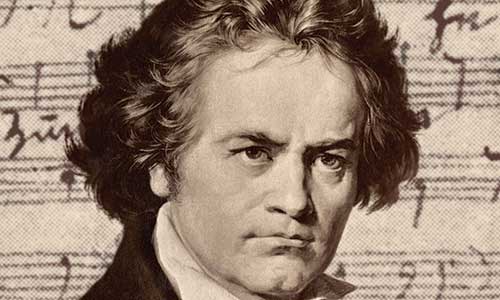Ludwig van Beethoven: Biography, Essay, Speech
Introduction
Ludwig van Beethoven lived a life that was not spectacular on the surface, yet emotionally and spiritually saturated. He created his masterpieces “in the face of his severe personal adversities” (Wikipedia, 2006). Beethoven’s deafness was one of such tribulations. However, none of the challenges prevented him from giving expression to his feelings and talent. Ludwig van Beethoven’s life story is truly an example of how human spirit finds its way through difficulties and limitations.
Early Years
Ludwig van Beethoven was born in 1770 in the small German town of Bonn, in the family of a court musician Johann van Beethoven, a native of Belgium. Johann became his son’s first music teacher; however, his limited talents and knowledge of music and heavy drinking prevented him from making another child prodigy in the style of Mozart out of his son. When Ludwig was only 9, he became a student with organist Christian Gottlob Neefe and published his first sonatas entitled “Kurfürst” (“Elector”) sonatas in 1783 (Wikipedia, 2006).
In 1792, seeking access to the throbbing musical life of the Austrian capital, Beethoven moved to Vienna. Some researchers insist that “in 1787 Beethoven made a brief, abortive journey to Vienna to see Mozart” in Vienna and impressed the renowned composer with his music (Kinderman 1997:16). Moving permanently to Vienna, Beethoven succeeded in obtaining a grant from his patron, “Elector” of Bonn Maximilian Franz, to sponsor his music education.

Moving to Vienna
Although there are hypotheses that Beethoven was eager to study music from Mozart himself, his teachers became Haydn, and later Albrechtsberger and Salieri (Prevot 2001). Beethoven succeeded in establishing his reputation in Vienna with his innovative, even if disturbing, music. His career started with the composition of opus 1 and his first symphony presented in 1800 that many people found “strange, overly extravagant, and even risqué” (Prevot 2001).
Although his music did seem unconventional, Beethoven in Vienna was able to find many admirers who proved his faithful supporters. The list of aristocrats that financially contributed to the career of the musician included “Prince Joseph Franz Lobkowicz, Prince Karl Lichnowsky, and Baron Gottfried van Swieten” (Wikipedia, 2006). Beethoven’s income also came from his teaching work. His students included Ferdinand Ries who was later to write a book on his communication with Beethoven, Carl Czerny who later became a music teacher, and even Archduke Rudolph, son of the Austrian emperor Leopold II. It was later Archduke Rudolph who together with three other aristocrats offered Beethoven a ‘scholarship’ in 1824 to keep him in Vienna when the composer received an offer from Jerome Bonaparte for a position at Westphalia court.
Deafness
In 1803, Beethoven devoted much of his time to the composition of the Ninth (“Eroica”) Symphony in which the new path he decided to take in music composition “ascended to a lofty summit with a commanding position in the history of the symphonic genre” (Kinderman 1987:96). The same time period marks the beginning of the composer’s heroic struggle with gradual loss of hearing. The causes of his deafness are not clear and have been attributed to a range of causes from syphilis to lead poisoning. Deafness was a trial for the composer who depended on his ears to govern his work. Apart from affecting his creative process, it also had a disastrous effect on his social life. To his friend Wegeler he wrote in 1801:
For almost two years I have ceased to attend any social functions, just because I find it impossible to say to people: I am deaf. (Hamburger 1952:61).
Deafness, however, did not stop his composition. More than ever, Beethoven retreated into music to find consolation for other grievances. In the same letter, he wrote to Wegeler: “I live entirely in my music” (Hamburger 1952:62). There are even speculations that loss of hearing made Beethoven more committed to art, isolating him from the world of people. In any case, his ability to compose music remained with him and enabled Beethoven to create more masterpieces such as the Third through Eighth Symphonies, Waldstein, Appassionata, Fidelio, and the Violin Concerto produced in his so-called Heroic, or Middle period that lasted from 1802 to 1812 – right at the time when he was growing increasingly deaf. In any case, this period is marked by the creation of Beethoven’s greatest works that formed the pinnacle of his genius, and in the opinion of many, of mankind’s music history as well.
Beethoven’s Love and Family Life
While it is commonly agreed that love life can be a powerful influence on the artist’s creative activity, Beethoven’s relationship with women remains a mystery to a great extent. Some researchers will even say that he “was never involved in a love-affair”, while others claim that he had many alternating love stories during his lifetime (Sterba 1994:97). Abstention from romantic involvement is explained partly by his involvement with music composition that he allegedly found more important than romance.
An intriguing episode in his biography is the composition of the epistle addressed to “The Immortal Beloved” during his course of hydrotherapy at Teplitz in 1812, to be later found with the Heiligenstadt Testament (Prevot 2001). Since it was known Beethoven was prone to start affairs with his female students, some of them were believed to be the addresses of this message. However, no hypothesis has received adequate documentary support, and at this point the mystery is likely to remain unresolved.
Although the composer never married, a remarkable event in 1815 exposed him to parental concerns. Following the death of his brother Kaspar Karl, Ludwig van Beethoven became the guardian of this son Karl. Beethoven accepted these responsibilities with great ardour. He began to live with the child, then 9, in order to insulate him from the harmful influences of his mother Johanna. However, Beethoven’s difficult character, a generation gap, and Johanna’s attempts to win back her child through litigation poisoned many years of Beethoven’s life.
Late Years
Receiving many invitations to play at the Congress of Vienna in 1814, Beethoven experienced one of the greatest moments of recognition in his life. His later period, however, was not as productive as the previous ones. His most renowned creations for that period include “five piano sonatas and the Diabelli Variations, the last two sonatas for cello and piano, the late quartets” (Wikipedia 2006). The two large works include the Missa Solemnis and the Ninth Symphony that was first played in 1824. This work brought the composer more recognition, but little financial reward.
Financial difficulties continued to plague the composer in his later life as many of his benefactors withdrew their support for various reasons. Thus, Prince Lobkowitz was beset by financial problems, and Prince Kinski died from an accident, with his heirs deciding to discontinue the support for Beethoven (Prevot 2001). Compounding financial problems was the failing health including jaundice that affected the composer’s liver starting in 1821. After a prolonged struggle with the disease, Beethoven died in 1827 to be buried in Vienna.
Conclusion
The artistic work of Ludwig van Beethoven, although strange and scary to many of his contemporaries, has turned into classics of world music and fascinates the minds of many people. The fact that much of this work was completed despite personal challenges boosts interest in his creation and biography. Beethoven’s life exemplifies the struggle of the creator to accomplish his work despite inner contradictions and external challenges. His life is an ode to the human spirit that can overcome enormous barriers to accomplish one’s vocation.
This biography essay is sponsored by https://smartwritingservice.com online custom writing service.







Can i use this article as a speech for my younger brother in school? let me know thank you
Hello,
You can use this article. Just give credit to end of the article if possible.
Thanks